[ad_1]
How about a bit of extra from the world of palaeontological philatelelely? Final time, we took a have a look at stamps from numerous international locations together with the UK, Poland, Cuba, and China, with the promise of extra to return, as a result of “we haven’t even talked about Tanzania but.” Finest get proper to that, then.
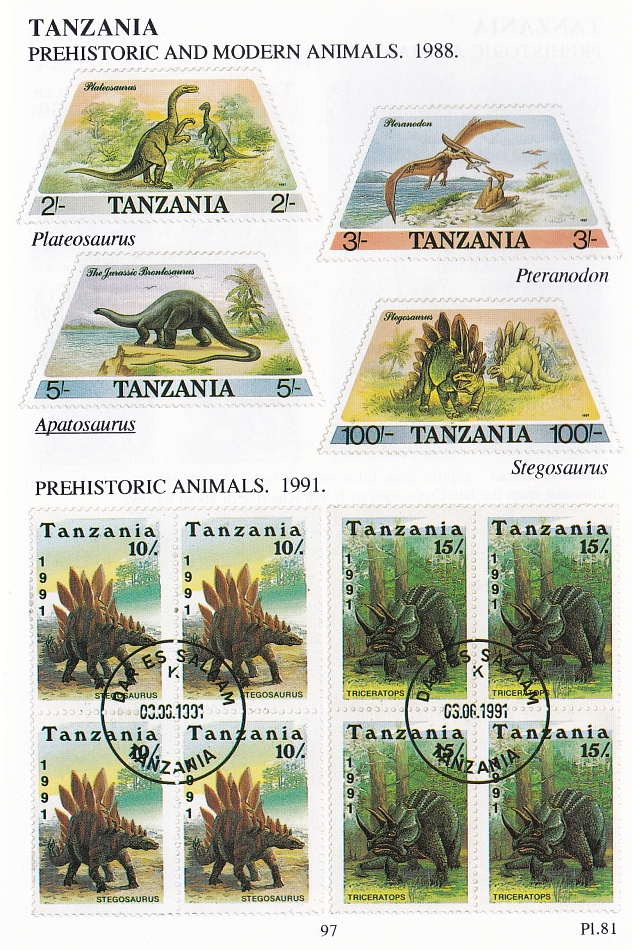
Though they date from 1988 and 1991, the art work on these stamps borrows from(/outright copies) a lot earlier palaeoart, most clearly Burian. Most stamps merely identify the animal, however the beautiful Burianesque Bronto is captioned “The Jurassic Brontosaurus,” I suppose as a result of it’s simply so very particular. That is sternly corrected to “Apatosaurus” by Baldwin and Halstead – ah, if solely they might have identified. (If solely I might have identified…)
The later Stegosaurus does stand out right here for being notably much less retro and odd-looking than the others – whereas 1988 Stego could be very pre-Dino Renaissance, 1991 Stego does seem to have absolutely erect forelimbs, a small head on a reasonably lengthy neck held properly above the bottom, and – presumably – an elevated tail. The plates even seem like prolonged by keratinous sheaths. It’s actually not all that dangerous for the time, on nearer inspection. Distinction with the Triceratops, that includes because it does a really lengthy, dragging tail and large nostril horn.
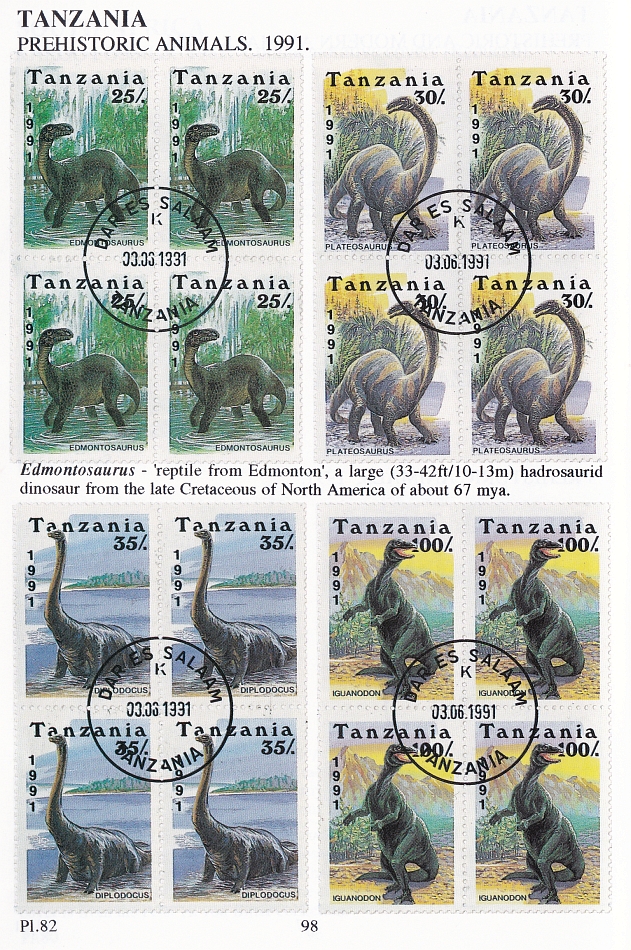
The remainder of the 1991 set is an equally combined bag. The Edmontosaurus and Plateosaurus aren’t too dangerous – the latter’s depiction as a quadruped is taken into account inaccurate lately, however was widespread on the time, and I actually love the plush background within the Edmontosaurus piece. However, the Diplodocus seems to be like a refugee from a time when sauropods had been regarded as semi-aquatic flesh-blobs, and the Iguanodon is simply plain bizarre. It has the imprecise type of a (retro, tripodal) Iguanodon, however seems to be missing the well-known thumb spikes utterly, and the pinnacle is an especially toothy, lizard-like affair. By the way, I bear in mind seeing that one (and never any of the significantly better ones) in an article in Dinosaurs! journal within the ’90s.

That stated, by far the strangest creation amongst this set is the Silvisaurus, depicted as some form of flattened, belly-creeping, semi-amphibious armour-plated slug-turtle. What the hell? The Rhamphorhynchus is significantly better by comparability, even when the artist appears to have been taking a look at previous reconstructions of the a lot shorter-tailed Pterodactylus. Particularly, the background scene is, as soon as once more, slightly attractive. All in all, a memorable set of stamps.

And now for one thing slightly totally different – this strikingly vibrant set of dinosaur stamps with splendidly sketchy outlines of very Zallingerian beasties, courting from 1972. Manama is a city, at this time within the United Arab Emirates, apparently well-known in philately circles for the manufacturing of stamps aimed fairly intentionally on the collectors’ market again within the Sixties. An American “philatelic entrepreneur” was concerned, in response to Wikipedia. A slightly unusual and unlikely historical past, however there we’re. It does clarify the fairly visually interesting nature of those stamps.
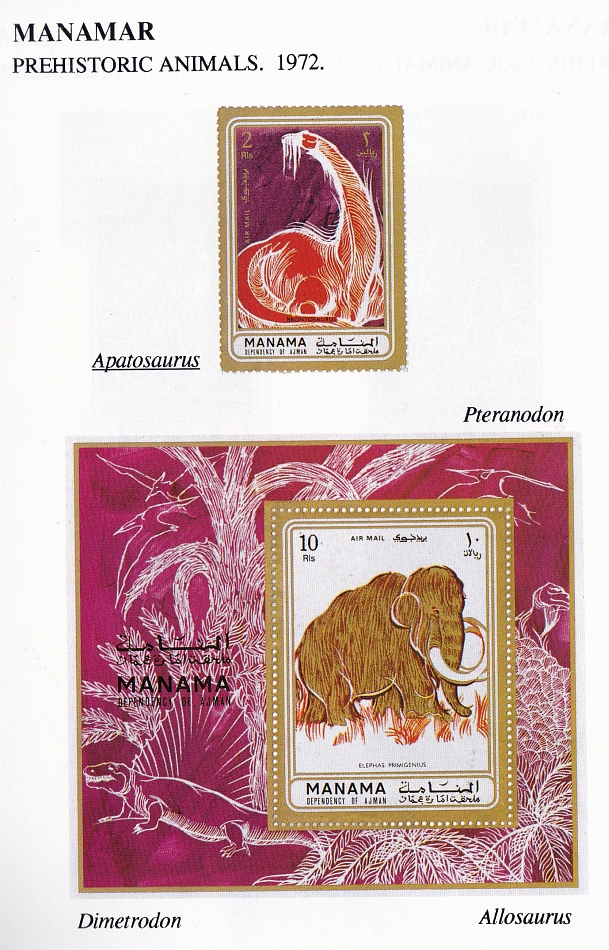
The Allosaurus and Brontosaurus (above) on this set are the obvious Zallinger riffs, paying homage to the guide reviewed right here as Dinosaurs and Different Prehistoric Reptiles and That Mural. The Dimetrodon lurking subsequent to the slightly cutely stylised mammoth additionally strongly resembles its The Age of Reptiles counterpart. The foliage right here is sort of beautiful and, sure, that mammoth could be very cute. Awww.

If the Manama stamps are stylistically uncommon, then the above set from Lesotho is uncommon merely in its material – footprints! I very very similar to the idea right here, and the eye to element in replicating the totally different trackways is commendable, particularly within the diverse traces discovered at Moyeni. It’s fascinating to notice that, though the small silhouetted life reconstructions of the animals right here present them dragging their tails, the illustrations of the trackways don’t characteristic any drag marks to point that. I suppose the artist was merely following conference, and didn’t put two and two collectively.

In the same vein to the ‘Owen’s Dinosauria’ stamps featured in my final publish, a sequence of stamps issued within the then-DDR again in 1973 featured the skeletal stays of varied animals to be discovered within the Pure Historical past Museum in Berlin. They boast an especially spectacular degree of cautious element, not least within the really iconic Archaeopteryx (and there’s a properly earned utilization of the time period ‘iconic’).

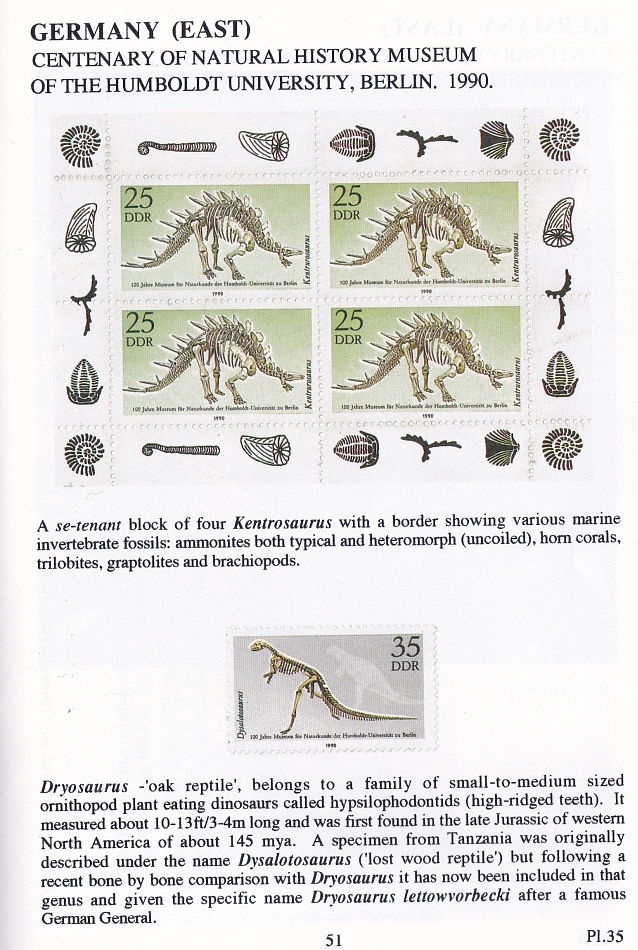
Additional stamps within the set characteristic the museum’s bigger dinosaurian stars, posed as their mounts had been again within the day – providing an fascinating perception into museum historical past, in addition to pure historical past. Nearly all of these skeletons have now been remounted, with straightened limbs and tails held proudly aloft, whereas the breathtaking Giraffatitan is posed dynamically striding ahead, a marvel of evolutionary engineering. Of all of the mounts depicted right here, solely the Kentrosaurus stays in the same posture at this time, for causes that had been most likely defined to me by Heinrich Mallison once I visited, however have now completely forgotten. Hey, when you occur to work (or have labored) on the museum, do let me know!

From the ultra-worthy and detailed to the, uh, considerably much less so, right here’s a delightfully kitschy set of stamps from Equatorial Guinea. They’re principally very Burian-like, particularly the Styracosaurus, however with bizarrely fudged particulars right here and there – the Triceratops has horns protruding from odd locations, Styracosaurus has an ultra-thin, mammal-like tail, and Ankylosaurus seems to be lacking a tail altogether. Nonetheless, given what the nation was going via round that point, I can’t think about good reference materials was notably simple to return by. I do take pleasure in their vibrancy, and the truth that the pterosaur art work very a lot jogs my memory of these cheapy foam gliding toys one used to see in every single place again within the ’90s (you recognize, the toys that had been one step up the evolutionary ladder from paper planes).

Baldwin may describe these illustrations as being “crude” and “poor”, and, properly, they’re. However for palaeoart nerds, there’s undoubtedly an attraction within the weird and the offbeat (to not point out all the intense colors, as a result of beneath all of the black clothes beats the center of an overgrown 5-year-old, in any case). Moreover which, that Diplodocus, though cartoony, isn’t that dangerous for the time, even when the serpentine plesiosaur actually is. I can’t assist however surprise if it hasn’t been the sufferer of confusion with mosasaurs, particularly given the creatures proven over on the left.
And eventually…Mongolia wasn’t the one nation to supply stamps that includes The Flintstones, however was maybe distinctive in giving them such an area spin. Take pleasure in.
P.S. “A sauropodomorph with stegosaurian affinities” – what on Earth is that speculated to imply?
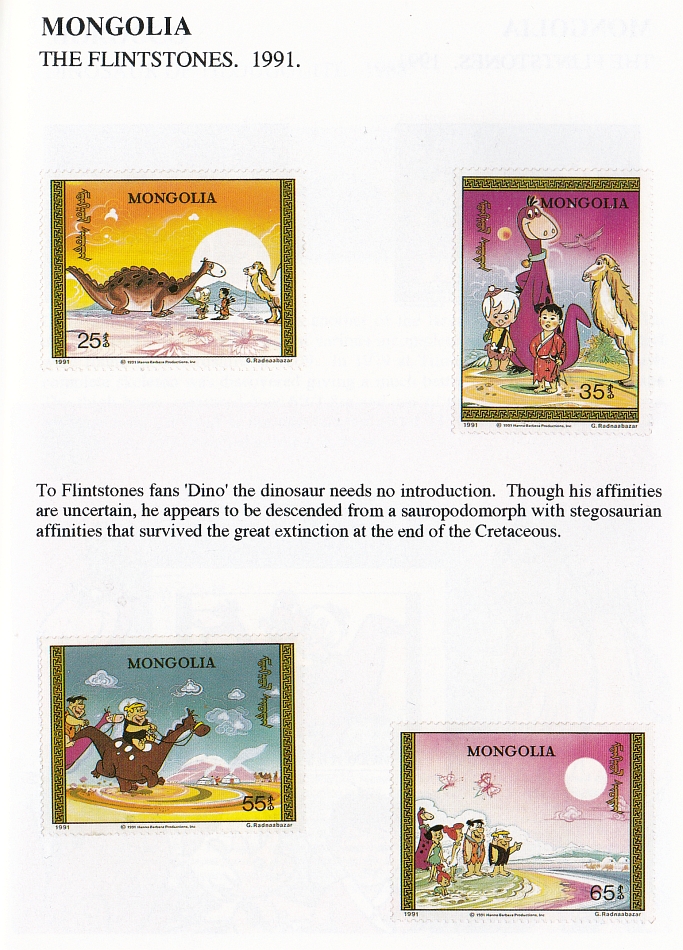

Associated
[ad_2]